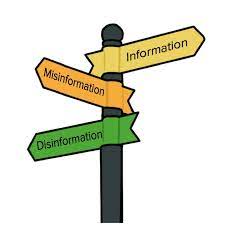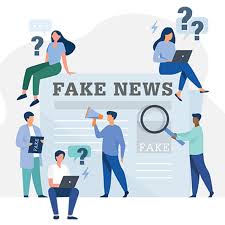Misinformation & Disinformation: What are they?
By Chan Hwang August 23rd 2022


Misinformation is an information that is mislead and spread regardless of any intent of deceiving others. The mislead information can come from news, social media, rumors, etc. These small minor mislead information may spread like wildfire due to the affect of social media. Although they are false lead information, it does not have to be intentionally spread for it to be considered a false information. You may have once seen an online post about something and reposted it until you realized that the post you saw had false information. These kind of small mistakes may lead to bigger misinformation.
Disinformation is different from misinformation. While misinformation is still a falsely lead information, inteionally or not, everything that comes from disinformation is purposely mislead information spread in order to deceive people for some sort of reason. This may lead to major problems around the world due to social media now being biggest reliable factor of information we have around our lives. Disinformation most often appears in fake news due to news being something that everyone around the world watches.
The difference between misinformation and disinformation is crucial. While both misinformation and disinformation is falsely spread information, there is one key thing that makes them different. Misinformation is false information spread regardless of any intent on deceiving others while disinformation is completely false information with its whole purpose serving to deceive people in one way or another to ahieve something.

So how are misinformation and disinformation spread? Usually, people use other people's interest in things and manipulate certain parts of the topic to make it believable for the people who read those topics. Usually, most often, fake news and social media is what spreads all the falsely led information. The reason being news and social media are the biggest part of people's lives where they obtain all sorts of information from. So people use that to their advantage to start a rumor or any falsely led information.
Due to social media being the biggest source where people obtain their information people who are attached to the social media platforms are more than likely to read a lot of falsely led informations. Also, social media platforms are the easiest way to spread misinformation since mostly everyone in 2022 uses online social media platforms to see whats trending and going around in the world.
AIs can spread misled inforamtions to users on social media. Things such as ads are what AIs control. We all see ads on social media platforms we use. The ads that pop up are based off of what we are interested in. Therefore the AIs search for ads about what we might be interested in. Because then there is a higher chance of the ad being clicked on or download or whatever the ad is about. And such ads may be false informations.

Videos are probably the more bigger factor of this problem than audio is. Videos on social media or wherever it is displayed may show falsely leading information to the viewers who watch it. As well as audio, which provides sound for us to process the information which the information may end up being a misleading information that we end up believing. An example of this may be podcast.
News, just like social media, is a huge part of our daily life where people watch on a daily basis. News is supposed to be the most trusted source of what's going on the outside world but people manipulate that trust to make fake news which leads to misleading information. People fall for these kind of things because they trust it or it sounds too good but doesn't realize it's actually not true.